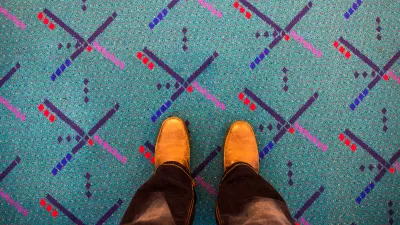Since the 1970s, many American cities have played host to rising rents and stagnant incomes. Richard Florida writes about how the "great rent squeeze" might be choking the country's economic prospects.

Following the Great Recession, Richard Florida writes, Americans have flocked to renting over homeownership. But both modes of housing consumption are getting more unaffordable. "Between 2001 and 2014, the number of renters who spend more than half of their income on rent grew by more than 50 percent, from 7.5 million to 11.4 million renters." Pulling from a new study by Denise DiPasquale and Michael Murray, Florida discusses why rents have increased at more than twice the rate of renter income growth since 1970.
A key point: higher rents may mean less demand for other things, hurting the consumer economy. "The rising share of income devoted to rent may be an important contributor to what economists dub secular stagnation, the inability of our economy to generate the robust demand required to sustain economic growth." Weighed down by rents, especially in major cities, the economy has fewer chances to provide for income growth: a vicious cycle.
Interestingly, Florida writes, the study doesn't assign blame to gentrification or the back-to-the-city movement. Nor does it point to land-use restrictions on rental housing supply. "The actual answer, according to the study, is much more basic. Renters are simply spending more money to consume more housing." Square footages and amenities in rental housing have increased a lot since the 1980s, mirroring a similar bloat in single-family homes.
Florida concludes by calling excessive demand for housing a "fetter on economic growth."
FULL STORY: The Great Rent Squeeze

Alabama: Trump Terminates Settlements for Black Communities Harmed By Raw Sewage
Trump deemed the landmark civil rights agreement “illegal DEI and environmental justice policy.”

Planetizen Federal Action Tracker
A weekly monitor of how Trump’s orders and actions are impacting planners and planning in America.

Why Should We Subsidize Public Transportation?
Many public transit agencies face financial stress due to rising costs, declining fare revenue, and declining subsidies. Transit advocates must provide a strong business case for increasing public transit funding.

Understanding Road Diets
An explainer from Momentum highlights the advantages of reducing vehicle lanes in favor of more bike, transit, and pedestrian infrastructure.

New California Law Regulates Warehouse Pollution
A new law tightens building and emissions regulations for large distribution warehouses to mitigate air pollution and traffic in surrounding communities.

Phoenix Announces Opening Date for Light Rail Extension
The South Central extension will connect South Phoenix to downtown and other major hubs starting on June 7.
Urban Design for Planners 1: Software Tools
This six-course series explores essential urban design concepts using open source software and equips planners with the tools they need to participate fully in the urban design process.
Planning for Universal Design
Learn the tools for implementing Universal Design in planning regulations.
Caltrans
Smith Gee Studio
Institute for Housing and Urban Development Studies (IHS)
City of Grandview
Harvard GSD Executive Education
Toledo-Lucas County Plan Commissions
Salt Lake City
NYU Wagner Graduate School of Public Service





























